La grande
poétesse anglaise Kathleen Raine, conseillère du CIRET, est morte dimanche 6
juillet 2003, à l’âge de 95 ans, des suites d’un accident. Son œuvre a
marqué le XXe siècle.
Le CIRET
est fier d’avoir pu organiser, le 21 septembre 1999, en son honneur et en
collaboration avec les Éditions du Rocher et la Maison de la Poésie de
Paris, une soirée mémorable au Théâtre Molière, avec la participation de
Kathleen Raine, Peter Brook, Diane de Margerie, Claire Garnier-Tardieu,
Christine Jordis, Marc Zammit et Basarab Nicolescu. La présence si perceptible
de Kathleen Raine nous a tous ébloui.
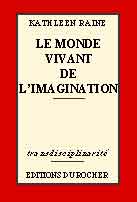
J’ai eu
le privilège d’éditer son livre Le monde vivant de l’Imagination
dans ma collection « Transdisciplinarité » aux Éditions du
Rocher. À cette occasion,
j’ai pu partager avec Kathleen Raine, dans son appartement de Londres ou lors
de sa visite à Paris, des moments inoubliables, qui resteront gravés pour
toujours dans ma mémoire.
Basarab Nicolescu
***
Kathleen Raine, Scholar and
Poet With Mystical Bent, Dies at 95
Wolfgang Saxon
Kathleen Raine, a mystically inclined
British poet and a scholar of Yeats and Blake, died on Sunday in London. She was
95.
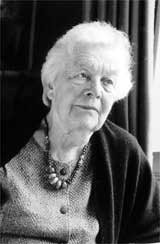
Less known in the United States than in
Europe, where she was regarded as a grande dame of European letters, she
published several books of poetry in America in addition to her scholarly works.
Starting in 1943, she published a
considerable œuvre
of her own even as she became a celebrated interpreter of the mystical poet
William Blake to the English-speaking world.
She was inspired at a very young age by
the visionary elements of English romance literature, and her poetic work has a
spiritual streak seeking to fuse reason and the ethereal, the knowable and
faith. Her tastes were eclectic, including Jungian psychology and neo-Platonism.
She preferred to think, citing W.B. Yeats,
that “poetry and religion are the same thing.” Over the years she attracted
many admirers, including the Prince of Wales, who in 1990 gave his patronage to
a “school of wisdom” that she founded, the Temenos Academy of Integral
Studies.
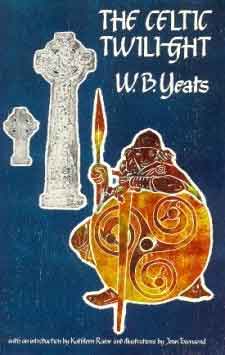
Temenos, a teaching institution, preached
a universalist theme, braiding the mystical strains of Buddhism and Hinduism
with Judaism, Christianity and Islam, a considerable departure from her strict
Methodist early upbringing. In 1999 she began the Temenos Academy Review,
which publishes selected lectures along with articles and poetry.
Britain’s Royal Society of Literature in
1991 named her one of the 10 greatest living writers. She received the Queen’s
Gold Medal for Poetry in 1992 and was honored as a Commander of the British
Empire three years ago.
By then her reputation was firmly
established well beyond Britain. Translations of her books on Yeats and Blake
were read from Sweden to Spain. Her first volume of autobiography, Farewell
Happy Fields, was published in 1973. In France the last two parts of her
three-part autobiography, The Land Unknown (1975), and The Lion’s
Mouth (1977), sold briskly as Le Royaume inconnu
(1978), and La
gueule du lion (1987), and she became
a commander of the Ordre des Arts et des Lettres in 2000.
Kathleen Jessie Raine was born in Ilford,
Essex. She studied natural sciences and psychology at Girton College, Cambridge,
and graduated in 1929.
While many of her contemporaries drifted
to the political left, she explored the mystique of Celtic history, magic and
astronomy. She spent the war years in and out of London in various jobs.
She made her debut with Stone and
Flower: Poems in 1943, followed by Living in Time. Her first book to
appear in the United States was The Pythoness and Other Poems in 1952.
In 1956 she received an appointment as a
fellow at Girton, where she taught and pursued her scholarly work.
She was briefly married to Hugh Sykes
Davies, a critic and Cambridge don, who died in 1984. Her second marriage to
Charles Madge, a poet and sociologist, also ended in divorce; he died in 1996.
She is survived by a daughter, Anna Hopwell Madge; a son, James Madge; four
grandchildren, and four great-grandchildren.
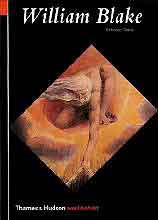
Kathleen Raine’s works currently listed
in Books in Print are Blake and Antiquity (Routledge; 2nd
ed., 2002); Collected Poems (Basic, 2001); India Seen Afar
(Braziller, 1991); Inner Journey of the Poet (Braziller, 1982); Defending
Ancient Springs (Anthropomorphic; repr., ed., 1985); Golgonooza—City of
Imagination: Last Studies of William Blake (Anthropomorphic, 1991); Presence:
Poems 1984-1987 (Anthropomorphic, 1987); Selected Poems
(Anthropomorphic, 1988); and William Blake (Thames Hudson, 1985).
*** *** ***
| |
|

|
Front Page
|
|
Spiritual Traditions
|
Mythology
|
Perennial Ethics
|
Spotlights
|
Epistemology
|
Alternative Medicine
|
Deep Ecology
|
Depth Psychology
|
Nonviolence &
Resistance
|
Literature
|
Books & Readings
|
Art
|
On the Lookout
|
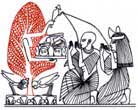
|
|